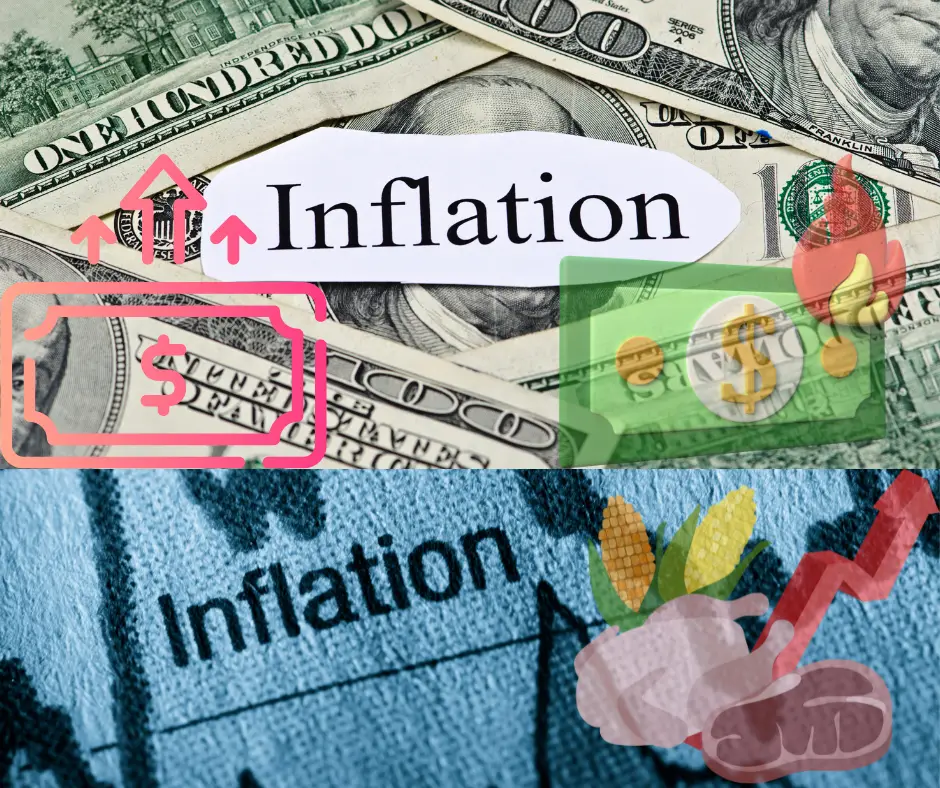In an economy, inflation is characterized by a gradual increase in the average price of goods and services, often resulting from economic growth. Nevertheless, excessive inflation can significantly reduce the purchasing power of savings and investments and destabilize the economy. Therefore, comprehending the impact of inflation on savings and investments is essential to protect wealth and ensure financial security. This post will try to answer the question of “How does inflation affect saving and investing?” and investigate the intricacies of inflation and its influence on savings and investments, using actual statistics and examples to demonstrate its effects on individuals, families, and entire economies. Moreover, it will analyze the complex correlation between inflation and financial stability, including its effect on buying power and investment returns.
Table of Contents
what is inflation?
Inflation is a term used to describe the increase in the general price level of goods and services in an economy over a period of time. Various economic measures are used to measure inflation, such as the GDP deflator, Producer Price Index (PPI), and Consumer Price Index (CPI). These indexes keep track of shifts in the costs of goods and services produced and consumed in an economy. Inflation can occur due to various factors such as excess demand, supply shortages, changes in production costs, monetary policies, and external factors like oil price changes or geopolitical events. Whatever the reason, inflation has a significant impact on firms, savers, investors, and consumers. It affects everything from investment strategies, pay negotiations, central bank policies, and consumer purchasing decisions.
How Inflation Affects Savings
Inflation can have significant consequences on an individual’s savings. One of the main impacts of inflation is the reduction in savings’ purchasing power. Over time, the actual value of money depreciates due to rising prices, resulting in fewer goods and services being available for the same amount of money.
This can be illustrated with an example. Suppose an individual has $10,000 deposited in a bank account with a nominal interest rate of 2% per year. In this case, the individual would expect an actual return of 2% per year on their savings. However, suppose the inflation rate is 3% per year. In that case, the actual return on the savings deposit would be -1%. This means that the purchasing power of the savings would decrease by 1% every year. Even in a low-growth environment, inflation can significantly reduce the purchasing power of savings. It is, therefore, essential to consider inflation when making financial decisions.
How Global Investments Are Affected by Inflation
Inflation is the rate at which prices for goods and services increase, significantly impacting the global economy and investment landscape. When inflation rises, the purchasing power of money decreases, and central banks often adjust their monetary policies accordingly, usually by increasing interest rates. This response is intended to control inflation, but it also raises borrowing costs, directly affecting investment decisions worldwide. As a result, higher borrowing costs can lead to reduced spending and investment in both the public and private sectors, potentially slowing economic growth.
Inflation and subsequent shifts in monetary policy play pivotal roles in the asset allocation strategies of global investors. During times of inflation, fixed-income securities like bonds become less appealing due to diminished real returns when adjusted for inflation. Consequently, investors often pivot to assets that historically fare better in inflationary climates, including commodities, real estate, and stocks within sectors less impacted by inflation.
Moreover, disparities in inflation rates among countries can affect the value of currencies, influencing international trade and investment flows. A country experiencing lower inflation may find its currency appreciating, which can make its exports costlier and imports less expensive, potentially impacting trade balances and cross-border investments.
In summary, inflation has a far-reaching impact on the global economic landscape, influencing interest rates, exchange rates, and overall investment sentiment, ultimately shaping the contours of global economic growth and investment strategies.
Strategies to Mitigate the Impact of Inflation
Despite the difficulties caused by inflation, investors can use several tactics to mitigate its effects on assets and savings:
Diversification
When inflation rises, it can hurt the overall returns of an investment portfolio. One way to minimize this effect is by diversifying the assets across different asset classes, industries, and geographic regions. This approach helps to spread the risk and reduce the overall impact of inflation.
To further safeguard against inflation, investing a portion of the portfolio in commodities, stocks, and real estate is recommended. These asset classes are known to be more resistant to inflationary periods. They can provide a sense of security to the portfolio. This strategy allows investors to enjoy a more stable and profitable investment portfolio, even during inflation.
Purchasing Real Assets
For various reasons, tangible assets have proven to be a reliable investment option. Firstly, they have shown to have a strong correlation with inflation, which means that they have the potential to maintain or increase in value over time. Additionally, tangible assets have been demonstrated to offer substantial long-term actual returns, which makes them an attractive alternative to other investment options.
Real assets are physical objects with inherent value that can be utilized or consumed. Examples are real estate, infrastructure, and natural resources. They provide diversification and help mitigate inflation and market volatility.
TIPS and Inflation-Linked Securities
Treasury Inflation-Protected Securities (TIPS) and other bonds that are linked to inflation are designed to protect fixed-income investments against the devaluing effects of inflation. These bonds adjust their principal value and interest payments in response to changes in inflation indices. This means that investors can be assured that their investments will remain stable even in inflationary conditions.
Floating-rate bonds
Floating-rate bonds are another useful investment option to consider during inflationary times. These bonds offer variable interest payments that are frequently adjusted based on changes in short-term interest rates. They are designed to retain the actual value of investments, which means that investors do not need to worry about their investments losing value due to inflation.
Equity Investments
Equity investments, including stocks, offer the potential for long-term real growth, dividend income, and capital appreciation. They have always been a helpful tool for investors looking to hedge against inflation. This is because stocks have historically offered higher returns than other asset classes over the long term, protecting investors against the eroding effects of inflation.
Conclusion:
Inflation has a significant impact on savings and investment decisions, as well as on investment returns and purchasing power. To protect their money, achieve their financial goals, and build resilient portfolios that can withstand inflationary conditions, investors need to understand how inflation works and implement appropriate solutions.
Investors can use various strategies, such as diversification, investing in tangible assets, allocating to TIPS and floating-rate bonds, and considering equity investments, to mitigate the effects of inflation and secure their financial futures in uncertain times
Other resources to read more on Inflation







